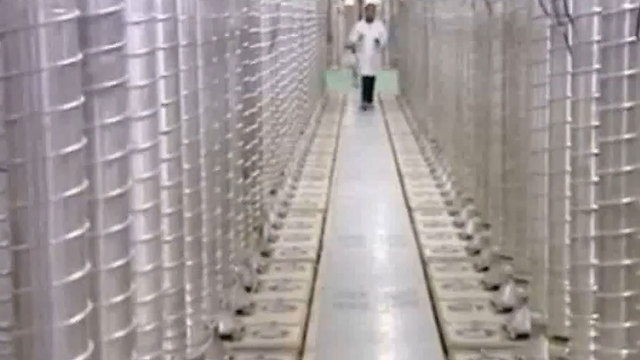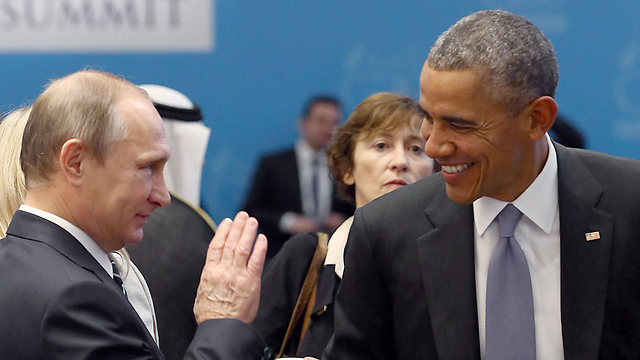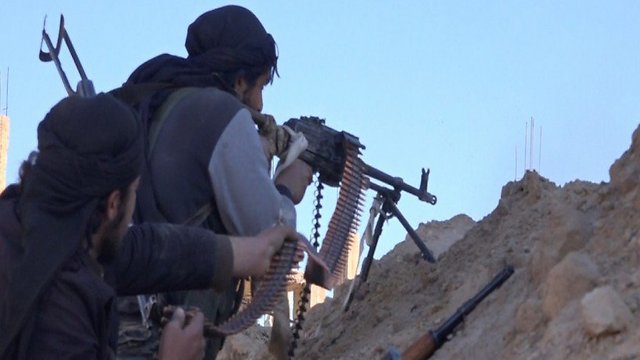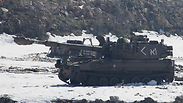
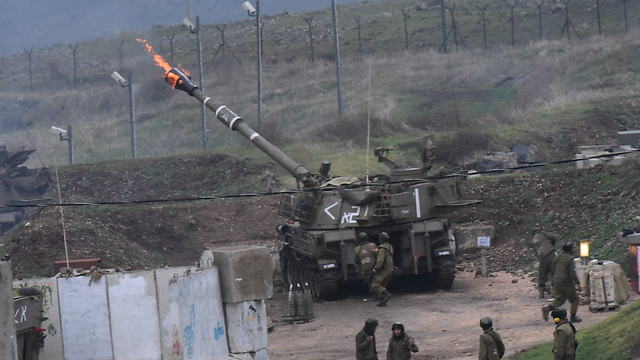
IDF preparing for possible war on northern, Gaza borders
Israel isn't expected to start a war of choice in the near future, but the IDF believes incidents on the borders with Syria, Lebanon and Gaza have the potential to ignite the area and create a tough conflict, which may include the taking of hostages by Israel's enemies.
According to IDF estimations, the likelihood of Israel initiating a war in the next year remains low, both due to the turmoil in the Middle East which is keeping many of Israel's enemies busy, and because of Israel's current deterrence abilities. Even so, the likelihood of a severe incident leading to an escalation and even a war has increased, and is being described by the IDF as "moderate." This is due to the tension along Israel's borders, especially the ones in the north and near the Gaza Strip.
Even so, Israel believes that Hezbollah and Hamas, as well as other jihadist organizations near the border - some of whom are as close as several hundred meters away from reaching Israeli school buses in the Golan Heights - are deterred by the IDF, which is considered an "aggressive and unpredictable" player.
These estimates are in line with IDF Chief of Staff Gadi Eisenkot's comments from last week, marking Hezbollah as the primary threat to Israel.
The IDF believes that a war in the north could include, in addition to missile fire, hostage taking by the enemy and damage to naval vessels.
"The next war will be different from the wars we've seen in the past 20-30 years. The conflict will be very complex," say IDF officials. "Hezbollah has turned the majority of its Shi'ite villages in southern Lebanon into massive strongholds. They're investing more in missile accuracy and warhead size, and are working more on underground warfare and bringing the war into our territory. Hezbollah started digging tunnels before Hamas did, and a war tunnel such as the ones dug under a Lebanese village can also be dug in the border area. But we have the knowledge and ability to hurt Hezbollah. These villages would be hit and this will lead to many refugees."
Hezbollah, which is mired in conflicts in Syria and Iraq fighting for the Assad regime, has seen 1,300 of its fighters die – twice the number of the 2006 Second Lebanon War – and 10,000 wounded. Even so, the IDF sees the terror organization's forces looking southward – towards Israel. Their priority seems to be gathering forces on the Israeli front rather than sending them over to Syria.
The changes Hezbollah's patrons in Iran are facing also affect the organization's ranks. The IDF estimates that Iranian President Hassan Rouhani cut Hezbollah's budget by about 10 percent (about $1 billion), two thirds of which come from Tehran every year. These cuts hurt Hezbollah's day-to-day operations.
The Iran nuclear deal is also seen by the IDF as an opportunity of sorts. "There are advantages to the nuclear deal," IDF officials said, "a better deal could've been reached, and there's a bit of frustration because the deal doesn't take care of the Iranian involvement in our region. But the damage to the amount of enriched material and the dramatic reduction in the number of centrifuges is something with which you can't argue."
The IDF sees the coming month as a critical time for Iran's future. Elections for the Iranian parliament, the Majlis, as well as the Assembly of Experts – a body which picks the next spiritual leader of the country – will take place in about a month. 12,000 candidates have registered, but the election committee has disqualified 40 percent of them, eventually leaving just 30 moderate candidates in.
"Rouhani came out against this decision and that's significant," IDF officials said. "Rouhani is saying, 'so why have elections at all? Even Jews and Christians have representation in the parliament.' The Iranian people want more freedom and openness to the West, and less religiosity."
In addition, the IDF estimates that Iran is set to receive tens of billions of dollars with the removal of sanctions, some of it used to cover past debts. Thus, Iran's way out of its current financial crisis is not clear yet. "Iran hasn't given up the dream of a regional hegemony. It's funding Hamas, attempting to have a hold in Judea and Samaria, and is guiding and paying for terrorist infrastructure in the Syrian Golan Heights."
On a strategic level, there seems to be a warming of Russian-American relations on the issue of Syria. This has an effect on other issues, such as the problems in Ukraine. The world powers' involvement stabilizes the region and doesn't allow extremists to take over. The Russians don't arm Hezbollah, but they communicate with the Shi'ite organization while telling Israel that it's in the Jewish state's interest to have an open line of communication between Russia and Hezbollah.
The radicals shouldn't be the ones to beat ISIS
As far as the coalitions battling ISIS, IDF officials carefully state that there are initial signs of the Islamic State's decline. "The world decided that it's fighting ISIS, that's the direction, and we need to go with the world. Even if an agreement on Syria were to be signed in Geneva or Vienna, it's very doubtful if it'll have any effect in the field. A bad result for us is having the radical axis beat ISIS and feel strong. We need to affect a different change. ISIS is an adaptive organization, and we need to wait another quarter to see about the decline in its power," they said.
The IDF believes that two or three additional large-scale terror attacks in Europe, for example attacks at soccer games, could lead to "a kind of third world war, in the sense of changing the Europeans' lives."
IDF officials also spoke of the Tel Aviv pub shooter Nashat Melhem, saying that he "took in inspiration from ISIS, and ISIS members saw what he did and are taking in inspiration back, without being in contact with him at all, and that strengthens them in a kind of circle."
Regarding the Palestinians, despite the deadly stabbing in Beit Horon on Monday, the IDF sees a large decline in the overall number of attacks and violent protests. "Groups of adults from Sair in the Hebron area have met with adults from Kabatya near Jenin in order to work out a solution together for preventing the village's youth from going out and perpetrating terror attacks. There are a lot of weapons in the field and we haven't seen a lot of them used for terrorist shooting attacks. You could perpetrate eight shooting attacks every night on Highway 60, and it doesn't happen," IDF officials said.
Regarding the chances of an escalation of tensions in the West Bank, the officials said, "There's a high potential for escalation in Judea and Samaria if there are no calming interventions such as economic restraints – with the example of work permits in Israel for about 100,000 Palestinians - and the continued security coordination with Israel."















